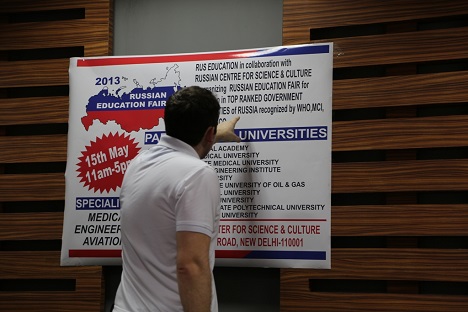Education in Russia: Indian students spoilt for choice

Russian Universities offer excellent education of the international standard and attract a large number of foreign students from all parts of the world every year. Source: Alexander Tomas
Russia has always been in the forefront in the field of education and more specifically medicine, engineering and aerospace. There are over 600 state higher education establishments currently operating in the Russian Federation. Students train in more than 500 specialties not only in the prestigious field of medicine, but also in other areas. The Russian Government puts high priority on facilitating training for local and foreign students alike. At present, there are about 100,000 international students from more than 200 countries studying in Russia.
Potential students visiting the Russian Education Fair 2013 in India have a multitude of options when it comes to studying in Russia: From Moscow to Vladivostok; from the Tver State Medical Academy, with many years of experience in training Indian students, to Vyatka State University, which started working with Indian students this year and plans to start teaching four disciplines in English next year.
“Vyatka State University was founded in 1963 as a technical institute. Today, it successfully combines traditions and innovations of higher technical education and the development of humanities,” says the university’s Head of External and International Relations Department Olga Yurlova. “We apply an individual approach to every student. They have the chance to go to summer camps and spa resorts for vacations.”
More than a thousand Indian students go to Russia every year. The most popular destinations are medical universities, which currently account for up to 90 percent of all Indian students. Volgograd State Medical University and Kazan State Medical University are the two leaders. “More than 80 percent of our graduates have their diplomas confirmed in India,” says Rodion Kudrin, Director of the Centre of International Economic Relations at Volgograd State Medical University. “One of the benefits of receiving medical education in Russia is the focus on practical skills. At Volgograd State Medical University, students can form a team of two or three to do practical training with a supervisor in a hospital after classes.”
About 300 Indian students receive their medical degree from Volgograd State Medical University every year. It is a six-year course, the first four years are taught in English, and the last two are taught in Russian. There are also postgraduate opportunities, with PhD courses, internships and residencies available both in English and Russian.
There is also strong demand for Russian technical education; however, the number of Indian students is much lower in technical universities because most of the courses are taught in Russia. Russian educators claim they are working on ways to improve this.
Tomsk Polytechnic University has established the Institute of International Education and Language Communication, which oversees all the departments working with foreign students. “We guide them throughout the entire course, from admission to graduation,” says Larisa Maletina, Deputy Director for International Education and Cooperation at the Institute of International Education and Language Communication. “If a student encounters a problem, they are welcome to come to us for help. This initiative has proved quite effective. The number of foreign students is growing.” According to Maletina, the most popular courses at Tomsk Polytechnic University are Mechanical Engineering, Electrical Engineering, Computer Sciences and Management.
Many visitors at the exhibition were interested in the Far Eastern Federal University. Its new campus, which President Putin officially presented to the university rector following the APEC summit in Vladivostok, means that it can easily compete with the more established Russian universities. “Thanks to the summit, we now have a cutting-edge media centre, where we organise conferences and video lectures by teachers from other countries and Russian cities,” says Incoming Student Mobility Coordinator Maria Bulanenko, adding that the university is ready to teach the most talented students free of charge. “We will pay excellent students a scholarship sufficient to cover university fees.”
Other participants at the exhibition include the Moscow Power Engineering Institute and Kursk State Medical University. They gave presentations to Calcutta school and university students on May 16 and will be in Chennai on May 19-20, before heading to Mumbai on May 21.
“Russian Universities offer excellent education of the international standard and attract a large number of foreign students from all parts of the world every year,” explains Elena Burman, head of Rus Education. “India is no exception, and many aspiring young Indians seek admission to Russian medical, engineering and other universities.”
According to Burman, bilateral economic and commercial ties between India and Russia in such fields as space research, engineering, technology, bio-chemistry, medicine, etc., require a large number of well-trained personnel. “As such, higher education received by Indian students in Russia will further enhance the abovementioned cooperation and promote Indo-Russian friendly and mutually beneficial partnership between the two countries,” she says.
The cost of higher education in Russia is much cheaper than that in the United States, the United Kingdom, etc. Both Russian- and English-language education tools are available there. The Russian education system is well known and accepted throughout the world for its elaborate and unique features and duly recognised by the UN authorities as well as the Medical Councils of the leading countries of the world. UNESCO and the World Health Oranization have always rated the Russian medical universities at a high level.
“Our education reaches new highs every year; our universities introduce programmes to train modern technologies... I wish you all good luck and success in your search for the ideal occupation, and I am certain that Russia will give you this chance,” said Russian Centre of Science and Culture director Fyodor Rozovsky.
All rights reserved by Rossiyskaya Gazeta.
Subscribe
to our newsletter!
Get the week's best stories straight to your inbox
